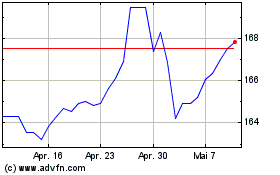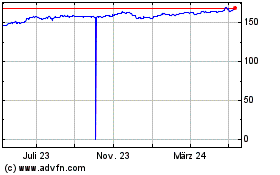ECB Holds Fire As Sluggish Eurozone Recovery Continues
03 September 2015 - 10:29AM
RTTF2
The European Central Bank left its interest rates unchanged on
Thursday as recent data suggest that economic recovery is
continuing, albeit at a sluggish pace, while lower oil prices,
stronger euro and the Chinese slowdown pose risks to the
outlook.
The Governing Council, led by ECB President Mario Draghi, kept
the refinancing rate at a record low 0.05 percent, following the
meeting in Frankfurt. The decision was in line with economists'
expectations.
The bank also left the deposit rate unchanged at -0.20 percent
and the marginal lending rate at 0.30 percent. The three main
interest rates were lowered by 10 basis points in September last
year.
Draghi will hold his customary post-decision press conference at
8.30 am ET, when he is set to unveil the latest ECB staff
macroeconomic forecasts. Inflation forecasts are widely expected to
be lowered. He is also expected to say that the eurozone is largely
immune to the recent Chinese financial market crisis.
In June, the inflation projection for this year was raised to
0.3 percent from zero, while forecasts for next year and 2017 were
maintained at 1.5 percent and 1.8 percent, respectively.
Growth projections for this year and next were retained at 1.5
and 1.9 percent, respectively. However, the prediction for 2017 was
lowered to 2 percent from 2.1 percent.
"The growth outlook is hardly strong and the concerns over China
and the appreciation of the euro present a serious external
threat," Capital Economics economist Jonathan Loynes said.
Inflation remained unchanged at a very low level of 0.2 percent
in August as further fall in oil prices curbed its ability to move
upward. The ECB aims to keep inflation 'below but close to 2
percent'.
Given the prospect of a renewed fall in inflation expectations,
the economist expects Draghi to insist again that the ECB's current
$1.1 trillion quantitative easing program will be implemented in
full.
Draghi may also give a further strong hint that that stimulus
might be extended or accelerated, or both, Loynes said. "He won't
say so, but part of the intention will no doubt be to weaken the
euro again," the economist added.
Eurozone economic growth slowed slightly to 0.3 percent in the
second quarter despite slight improvement in Germany, as France
came to a halt, restoring the divergence between the two largest
euro area economies.
In a report released Thursday, the International Monetary Fund
urged the European Central Bank to extend its quantitative easing
programme if there isn't sufficient improvement in inflation
consistent with meeting medium-term price stability objectives.
Euro vs Yen (FX:EURJPY)
Forex Chart
Von Mär 2024 bis Apr 2024

Euro vs Yen (FX:EURJPY)
Forex Chart
Von Apr 2023 bis Apr 2024
